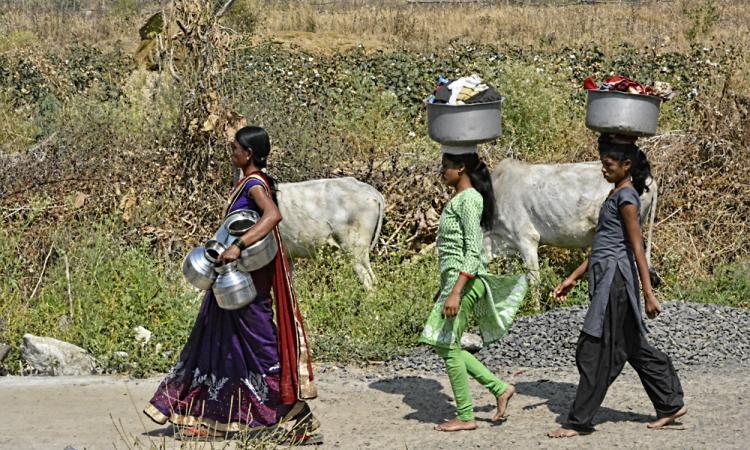
As a woman achieves power, the barriers will fall
In the remote district of Dindori, Madhya Pradesh, lies the village of Kathariya. The area is home to the marginalised Baiga community, recognised as a Particularly Vulnerable Tribal Group (PVTG) by the Government of India. WaterAid India initiated its intervention in Kathariya in 2019, collaborating with the district administration to ensure access to safe drinking water and individual household toilets for the community.
During this transformative journey, 37-year-old Jaymati Bai, a pump operator and president of the Village Water and Sanitation Committee (VWSC) from the village, played a pivotal role in community mobilisation and raising awareness among the residents. Jaymati, witnessing the challenges of fetching water from 2 kilometres away, pledged to ensure household-level connections for every family. A spring-based piped water supply scheme, powered by solar energy, now provides drinking water to all households in Kathariya.
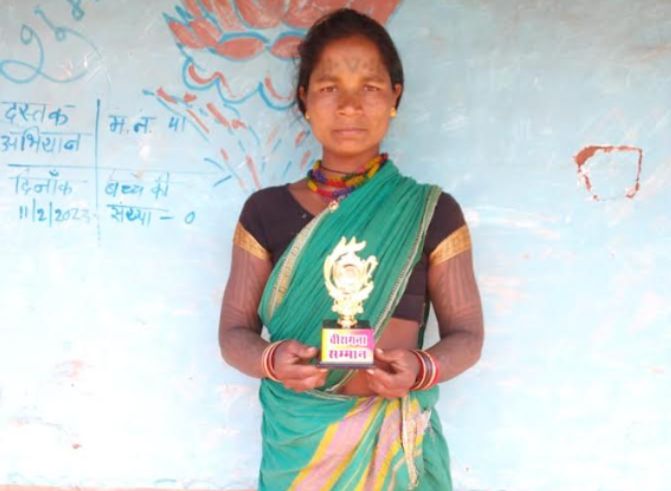
Leading interventions in identifying each household, Jaymati negotiated with the community and the panchayat for their partial contribution to the total scheme cost. Jaymati has taken charge of conducting regular water quality tests at all drinking water points in the village using field test kits. She also trained one woman from each hamlet in the village on water quality and the usage of field test kits.
A water supply roster was established and approved through a resolution in the gram sabha, ensuring that every household in the village receives safe drinking water. As the pump operator of the Piped Water Supply Scheme (PWSS), Jaymati facilitates water tax collections, which contributes to the operation and maintenance of the PWSS.
On March 20, 2023, Jaymati was honoured for her exemplary work in water supply scheme maintenance during a district event commemorating Martyr Avantibai's death anniversary. The recognition took place in the presence of district officials and former Chief Minister, Ms. Uma Bharti.
From toddy tapping to water empowerment: S Krishnaveni's iJal Station success story
S Krishnaveni serves as an operator at an iJal station located in Kamanchikal, Telangana. With a start date in 2017, Krishnaveni takes pride in being both an entrepreneur and the operator of the iJal station. The Safe Water Network team provided training on iJal operations, and she manages the day-to-day plant operations of the automatic facility that operates 24x7.
Her responsibilities include producing treated water, conducting water quality tests, and overseeing the sale of water. Consumers use prepaid cards for convenient water collection, and Krishnaveni recharges these cards using a tablet. In addition to her operational duties, she actively educates her community about the importance of can washing, water quality, and the significance of consuming safe water for good health.
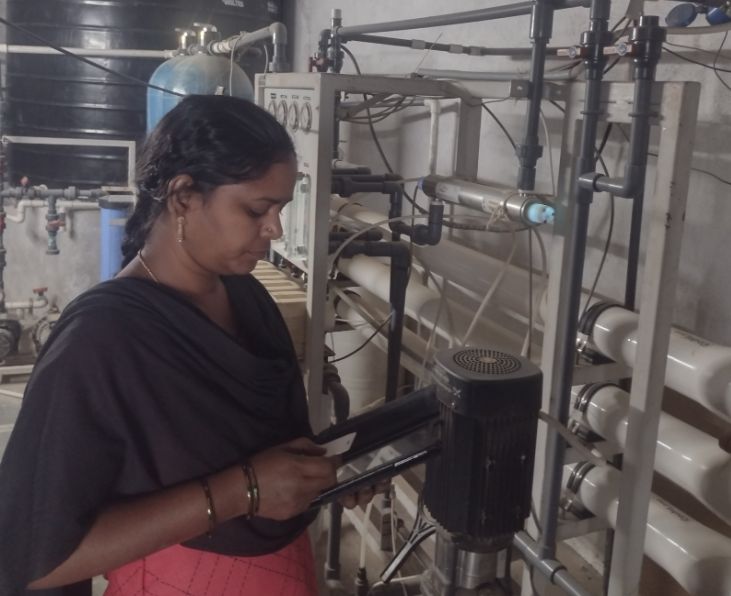
Known as 'Water Aunty' in the village, Krishnaveni and her husband transitioned from their previous caste-based occupation of toddy tapping, which provided meagre earnings, to the iJal station initiative. Introduced to the concept through her husband's friend at the Nagulavancha iJal station, Krishnaveni was impressed by the cleanliness and efficiency of iJal stations, which stood out from other water plants in the area.
Motivated by the lack of a water station in their village, they established the iJal station, providing clean water at Rs. 5 per 20 litres through a prepaid card system, a significant improvement from the Rs. 15 per 20 litres charged by a distributor from Khammam. The community appreciates the accessibility and affordability of water, resulting in positive recognition from SHGs and local leaders.
The establishment of the iJal station has brought positive changes to their lives, providing a stable monthly income. As a result, Krishnaveni was able to send her children to study at a private school in Khammam, marking a significant improvement in their overall well-being.
Women trailblazers in Athantar's water transformation
Sunanda Das, an inspiration for many in Athantar Village, Khordha District, serves as a self-employed mechanic (SEM) for the piped water supply scheme. In a village with 407 households and 1,790 residents, Sunanda has defied gender norms by excelling in a male-dominated sector. Initially motivated by a monthly remuneration of Rs. 300 and a bicycle, Sunanda's determination has made her a respected figure in her community.
Facing societal challenges, Sunanda overcame adversity, undergoing training in hand pump repair, obtaining certification, and completing her graduation. Today, she earns Rs. 4,000 monthly, playing a pivotal role in the in-village PWS scheme. Sunanda conducts water quality tests, manages pump operations, and oversees distribution networks. Under the Jal Jeevan Mission, she received training in plumbing, contributing to the community's water supply needs.
Sunanda collaborates with other empowered women, such as Suchitra Sen, a Junior Engineer, and Arundhati Nayak, a Panchayat Executive Officer. Together, they formed the Village Water and Sanitation Committee (VWSC) and developed the Village Action Plan (VAP) in alignment with the Jal Jeevan Mission guidelines.
The trio addressed water quality issues in the village, commissioning an Iron Removal Plant to treat the groundwater's iron content. As a result, the in-village water supply scheme significantly increased the water supply level from 40 lpcd to 70 lpcd. Today, 97.3% of households have tap water access, benefiting schools, Anganwadi centres, and overall village hygiene.
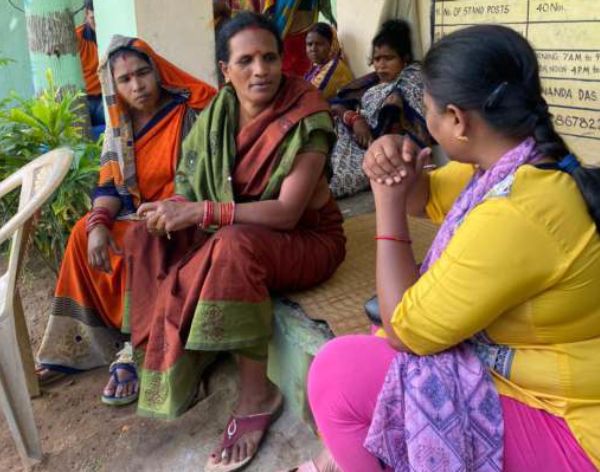
Beyond water supply, the empowered women advocated for water user charges to sustain the scheme. They leveraged the 15th finance commission tied grant for electricity payments, emphasising the importance of community contributions. Additionally, the trio motivated women to form a Self-Help Group (SHG), engaging in diverse activities like livestock rearing, dairy farming, mushroom cultivation, handicrafts, and tailoring.
Through their efforts, these women have not only transformed water supply in Athantar Village but also fostered economic empowerment, community cohesion, and sustainable development, showcasing the impact of determined individuals in creating positive change.
Women's SHG leads water conservation and catchment area protection
The Members of the SHG Hobalitha Sangma, Batela Momin, Hetboline Sangma, Ritha Momin, Selsina Momin, Sengchi Momin, and Grikchina Momin, are involved in water conservation in the Upper Chichra Watershed
The A'ding Women's Self Help Group (SHG) in Rongjeng Block in East Garo Hills in Meghalaya has emerged as a force for change. Comprising seven enterprising members, this SHG has not only uplifted their own livelihoods but has also become the vanguard for water conservation and catchment area protection in their community.
Understanding that the dam was a lifeline for their village, the SHG members took it upon themselves to ensure its proper maintenance and sustainable use. They organised regular cleanup drives along the dam's banks, removing debris and preventing pollution. Their efforts not only improved the water quality but also created a cleaner and more aesthetically pleasing environment for the entire community to enjoy.
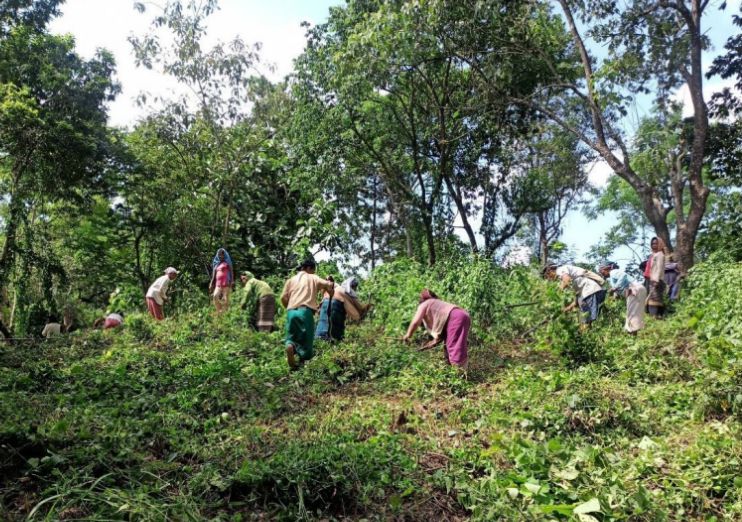
Considering that the health of their water sources depended on the surrounding catchment areas, the SHG embarked on a tree-planting campaign. The SHG members initiated a comprehensive catchment protection program. They organised tree-planting drives, meticulously selecting native species to reforest the hillsides. These trees acted as natural barriers against soil erosion, preventing sedimentation in streams and rivers.
The result was not only cleaner water but also enhanced biodiversity and a rejuvenated ecosystem. They reforested degraded areas, creating natural buffers to prevent soil erosion and maintain water quality. Their efforts not only revitalised the landscape but also provided a habitat for local wildlife.
The impact of the A'ding Women's SHG was soon felt throughout the village. With improved access to clean water, agriculture flourished, leading to increased yields and food security. The rejuvenated catchment areas became a source of pride for the community, showcasing what collective action and determination could achieve.
/articles/women-leading-charge-water-transformation-and-conservation